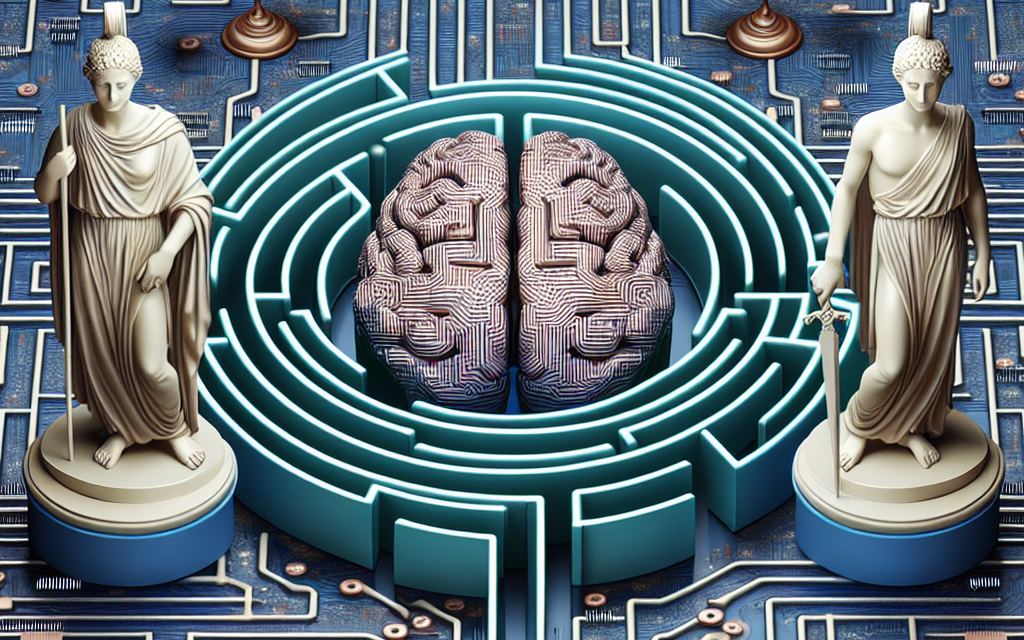Navigating the Ethical Landscape of AI in Mental Health Diagnosis
The integration of artificial intelligence (AI) into mental health diagnosis is a rapidly evolving field that holds great promise for improving patient outcomes. However, it also raises significant ethical concerns that must be navigated carefully. This article explores the ethical landscape of AI in mental health diagnosis, focusing on five key subtopics: the accuracy and reliability of AI systems, data privacy and consent, bias and fairness, the role of human oversight, and the implications for patient autonomy. Each section will delve into the complexities of these issues, providing insights and examples to illustrate the challenges and opportunities presented by AI in mental health care.
1. Accuracy and Reliability of AI Systems
One of the primary concerns surrounding the use of AI in mental health diagnosis is the accuracy and reliability of these systems. AI algorithms, particularly those based on machine learning, rely on vast amounts of data to identify patterns and make predictions. In mental health, this data often includes patient histories, symptom reports, and even social media activity. However, the accuracy of AI systems can vary significantly based on several factors.
First, the quality of the data used to train AI models is crucial. If the data is biased or incomplete, the AI’s predictions may be flawed. For instance, a study published in the journal *Nature* found that AI systems trained on predominantly white populations performed poorly when applied to diverse groups. This raises concerns about the generalizability of AI tools across different demographics.
Moreover, the complexity of mental health conditions poses additional challenges. Mental health diagnoses often rely on subjective assessments and nuanced understanding of human behavior, which can be difficult for AI to replicate. For example, while AI can analyze speech patterns or facial expressions to detect signs of depression, it may miss contextual factors that a trained clinician would consider. This limitation highlights the need for ongoing research to improve the accuracy of AI systems in mental health.
- Case Study: IBM Watson for Oncology – IBM Watson was initially heralded as a revolutionary tool for diagnosing cancer. However, it faced criticism for its inaccuracies and was found to provide unsafe treatment recommendations in some cases. This example underscores the importance of rigorous testing and validation of AI systems before they are implemented in clinical settings.
- Statistical Insights – A meta-analysis of AI diagnostic tools in mental health found that while some systems achieved over 80% accuracy, others fell below 50%. This variability emphasizes the need for standardized benchmarks and validation processes.
In conclusion, while AI has the potential to enhance diagnostic accuracy in mental health, it is essential to ensure that these systems are rigorously tested and validated across diverse populations. Ongoing research and collaboration between technologists and mental health professionals will be critical in addressing these challenges.
2. Data Privacy and Consent
The use of AI in mental health diagnosis raises significant concerns regarding data privacy and informed consent. Mental health data is particularly sensitive, and the potential for misuse or unauthorized access is a pressing issue. As AI systems often require large datasets to function effectively, ensuring the privacy of patient information becomes paramount.
One of the key ethical principles in healthcare is informed consent, which requires that patients understand how their data will be used and the potential risks involved. However, the complexity of AI algorithms can make it difficult for patients to fully grasp how their data will be utilized. For instance, if a patient consents to their data being used for research purposes, they may not be aware that it could also be used to train AI systems that make diagnostic decisions.
- Case Study: GDPR Compliance – The General Data Protection Regulation (GDPR) in Europe has set stringent guidelines for data privacy, requiring explicit consent from individuals before their data can be processed. This regulation has prompted many AI developers to rethink their data collection practices, ensuring that they prioritize patient privacy.
- Statistics on Data Breaches – According to a report by the Identity Theft Resource Center, data breaches in the healthcare sector increased by 25% in 2020. This statistic highlights the vulnerabilities associated with handling sensitive mental health data.
To address these concerns, it is essential for AI developers and mental health professionals to work together to create transparent data usage policies. Patients should be educated about how their data will be used and the measures in place to protect their privacy. Additionally, implementing robust cybersecurity measures is crucial to safeguarding sensitive information.
3. Bias and Fairness
Bias in AI systems is a critical ethical issue that can have profound implications for mental health diagnosis. AI algorithms can inadvertently perpetuate existing biases present in the training data, leading to unfair treatment of certain populations. This is particularly concerning in mental health, where marginalized groups may already face disparities in access to care and quality of treatment.
For example, a study published in the journal *Health Affairs* found that AI algorithms used in healthcare disproportionately favored white patients over Black patients in predicting health outcomes. This bias can result in misdiagnosis or inadequate treatment for individuals from underrepresented groups, exacerbating existing health disparities.
- Case Study: COMPAS Algorithm – The Correctional Offender Management Profiling for Alternative Sanctions (COMPAS) algorithm, used in the criminal justice system, faced backlash for racial bias in its risk assessments. This case serves as a cautionary tale for the mental health field, emphasizing the need for fairness and equity in AI applications.
- Statistics on Mental Health Disparities – According to the National Alliance on Mental Illness, people of color are less likely to receive mental health treatment compared to their white counterparts. If AI systems are biased, they may further entrench these disparities.
To mitigate bias in AI systems, developers must prioritize diversity in their training datasets and implement fairness audits to assess the impact of their algorithms on different populations. Engaging with community stakeholders and mental health advocates can also help ensure that AI tools are designed with equity in mind.
4. The Role of Human Oversight
As AI systems become more integrated into mental health diagnosis, the question of human oversight becomes increasingly important. While AI can assist in identifying patterns and making recommendations, the ultimate responsibility for diagnosis and treatment should remain with qualified mental health professionals. This is particularly crucial given the complexities and nuances of mental health conditions.
Human oversight is essential for several reasons. First, mental health diagnoses often require a comprehensive understanding of a patient’s history, context, and individual circumstances—factors that AI may not fully capture. For instance, a patient presenting with anxiety may have underlying trauma that an AI system could overlook. A trained clinician can provide a more holistic assessment, considering both clinical data and the patient’s lived experience.
- Case Study: AI-Assisted Therapy – Some AI applications, such as Woebot, offer therapeutic support through chatbots. While these tools can provide valuable resources, they are not a substitute for human therapists. Studies have shown that patients often prefer human interaction for discussing sensitive issues.
- Statistics on Diagnostic Errors – Research indicates that diagnostic errors in mental health can occur in up to 30% of cases. This statistic underscores the importance of human oversight in ensuring accurate diagnoses and appropriate treatment plans.
To strike the right balance between AI and human oversight, mental health professionals should be trained to interpret AI-generated insights critically. Collaborative models that combine AI capabilities with human expertise can enhance diagnostic accuracy while ensuring that patients receive compassionate and personalized care.
5. Implications for Patient Autonomy
The use of AI in mental health diagnosis also raises important questions about patient autonomy. Autonomy is a fundamental principle in healthcare, emphasizing the right of patients to make informed decisions about their treatment. However, the introduction of AI tools can complicate this dynamic, particularly if patients feel that their choices are being influenced or overridden by technology.
For instance, if an AI system recommends a specific treatment based on data analysis, patients may feel pressured to follow that recommendation without fully understanding the rationale behind it. This can lead to a sense of disempowerment, particularly if patients are not adequately informed about how the AI arrived at its conclusions.
- Case Study: AI in Decision-Making – A study published in *JAMA Network Open* found that patients were less likely to engage in shared decision-making when AI tools were involved in treatment recommendations. This highlights the need for transparency and communication in the use of AI in mental health.
- Statistics on Patient Preferences – Research indicates that over 70% of patients prefer to be involved in decisions about their treatment. Ensuring that AI tools support rather than undermine patient autonomy is essential for fostering trust and collaboration.
To uphold patient autonomy, mental health professionals must prioritize clear communication about the role of AI in diagnosis and treatment. Patients should be encouraged to ask questions and express their preferences, ensuring that their voices are heard in the decision-making process. Additionally, developing AI systems that are transparent and explainable can help patients understand how their data is being used and the rationale behind AI-generated recommendations.
Conclusion
The integration of AI into mental health diagnosis presents both exciting opportunities and significant ethical challenges. As we navigate this complex landscape, it is essential to prioritize accuracy and reliability, data privacy and consent, bias and fairness, human oversight, and patient autonomy. By addressing these ethical concerns, we can harness the potential of AI to improve mental health care while ensuring that patients receive compassionate, equitable, and informed treatment.
Ultimately, the successful implementation of AI in mental health diagnosis will depend on collaboration between technologists, mental health professionals, and patients. By working together, we can create a future where AI enhances the diagnostic process while upholding the ethical principles that are fundamental to healthcare.





